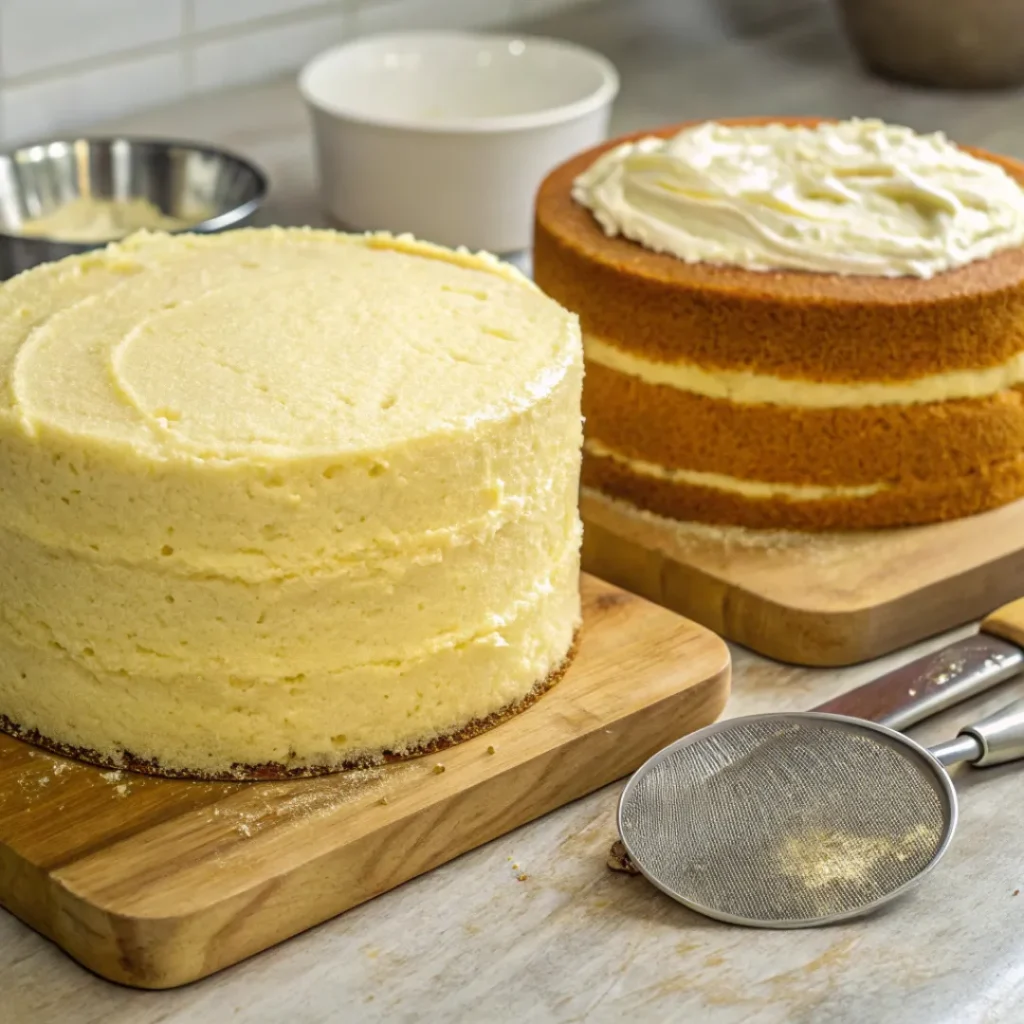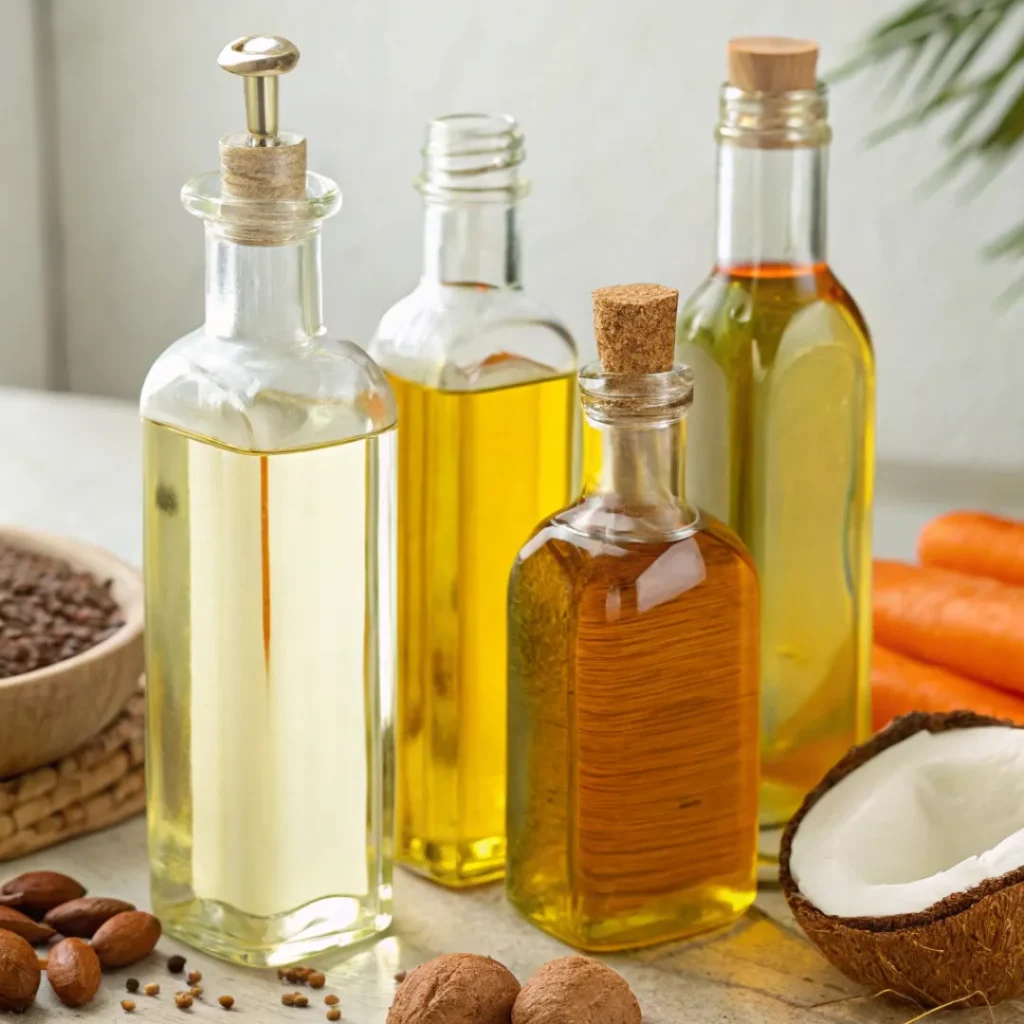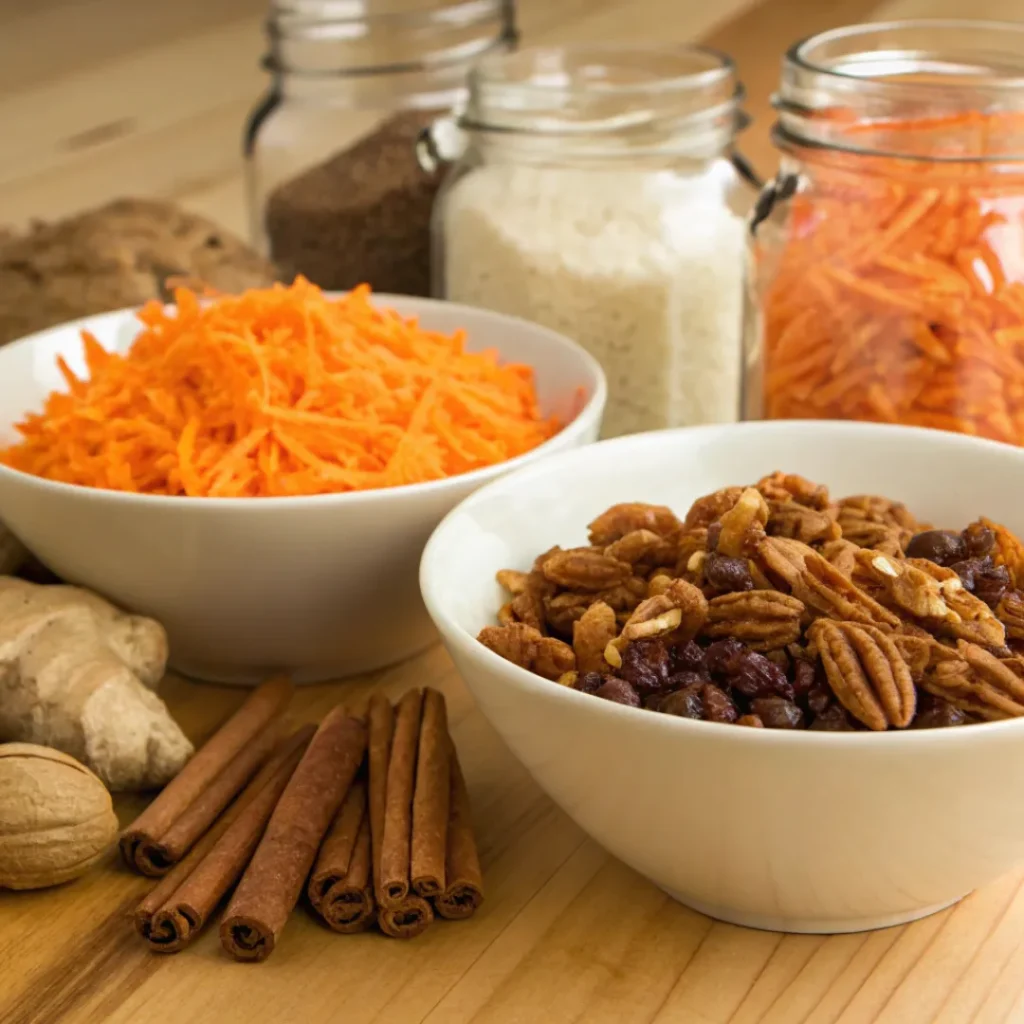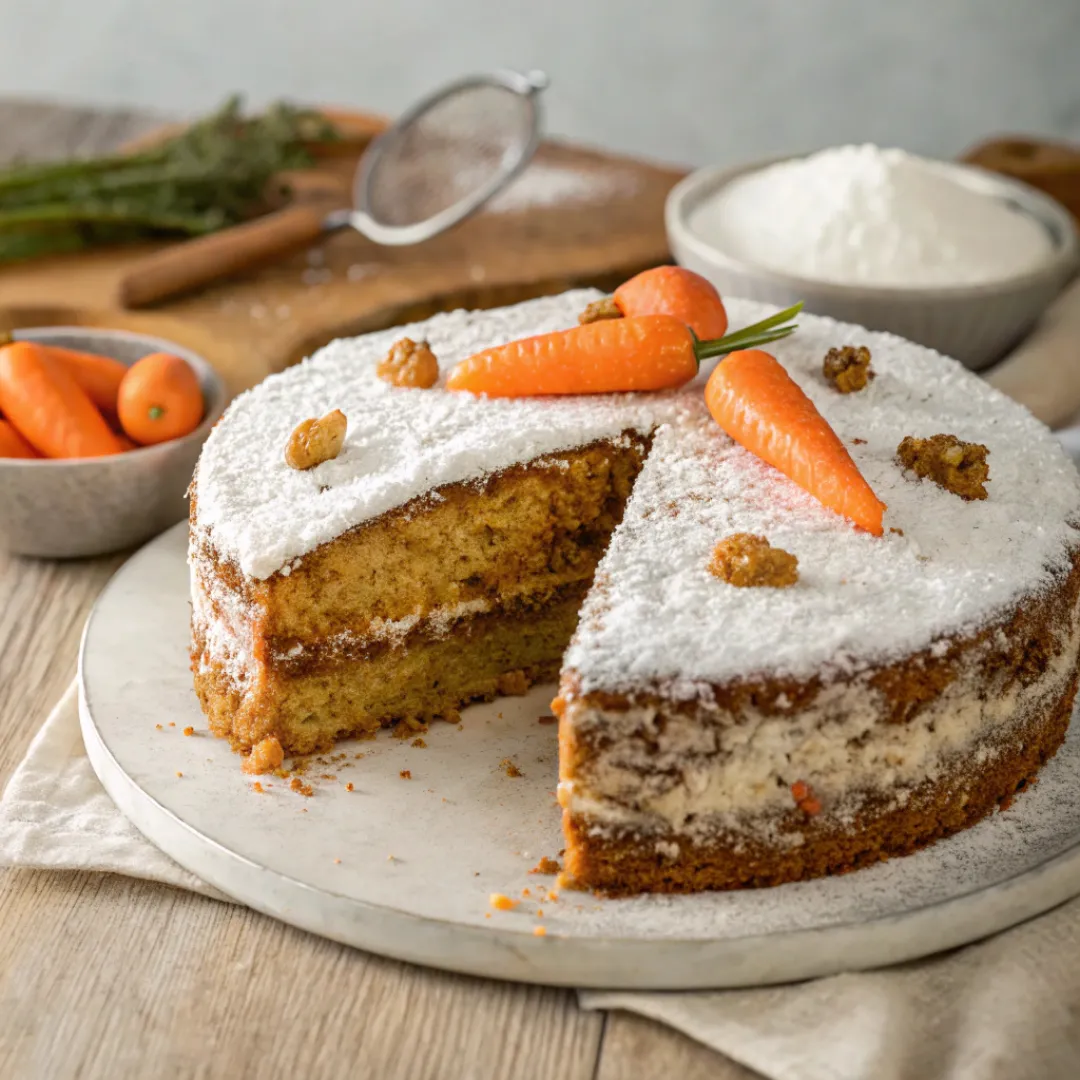Carrot cake is a beloved dessert known for its rich, moist texture, warm spices, and the natural sweetness from grated carrots. One common question that comes up for both novice and experienced bakers is: Why Not Use Butter in Carrot Cake? After all, butter is a staple in many cakes, adding richness and flavor. Yet, carrot cake recipes often call for oil instead of butter. This article will dive deep into the reasons behind this baking choice and explore the science of baking, the role of ingredients in carrot cake, and alternative methods to make your cake healthier or suited to your taste.
The Science Behind Baking with Butter vs. Oil
Both butter and oil play different roles in baking, but they have unique effects on the texture and flavor of cakes. Butter, with its water and fat content, creates a denser texture and richer flavor, while oil ensures a moist and tender crumb, which is crucial for carrot cake.

Learn the difference between baking with oil and butter to understand how these fats affect your cakes.
Butter
Butter contains approximately 80% fat and 20% water, along with milk solids. When you bake with butter, the water evaporates during the baking process, which can give a cake a denser, more structured texture. Butter also contributes a distinct, rich flavor and makes cakes tender by trapping air when creamed with sugar.
Oil
Oil, on the other hand, is 100% fat with no water content. It creates a more moist, softer crumb because it coats the flour proteins better than butter, preventing them from over-developing gluten, which can result in a denser cake. Since carrot cake is a dense, rich cake, oil ensures a moist, tender crumb, which is ideal for this type of dessert.
Why Oil is Used in Carrot Cake
Carrot cake is unique in its flavor and texture. It’s not a light and airy cake like a sponge or chiffon cake, where butter might be more appropriate for providing structure and lift. Carrot cake is dense and moist, which is why oil works better than butter in this recipe.
Moisture Retention
Because oil is 100% fat, it helps retain moisture better than butter. Carrot cake relies on moisture not only from the grated carrots but also from the oil used in the recipe. The goal is to keep the cake rich and moist without drying out during baking, which can happen when using butter due to its water content evaporating.
Consistency and Tenderness
Oil coats flour proteins better than butter, leading to a more tender crumb. This is important for a carrot cake because the cake already has heavy, dense ingredients like grated carrots, nuts, and sometimes pineapple or raisins. Oil helps counterbalance the heaviness, making the cake moist and tender rather than tough and dry.
Moisture and Texture: The Key to Carrot Cake’s Success
Carrot cake’s hallmark feature is its incredibly moist texture. Unlike some cakes where a fluffy, light texture is desired, carrot cake’s moisture and density are its key selling points. Oil plays a crucial role in achieving this texture.
The Role of Carrots in Moisture
Carrots themselves contribute to the cake’s moisture, as they release water during baking. Oil helps to complement this, ensuring that the cake remains moist for days after baking. Using butter could dry out the cake faster as it doesn’t provide the same level of fat or moisture retention.
Texture Control
Butter tends to firm up when it cools, whereas oil remains liquid at room temperature. This means that an oil-based carrot cake will stay soft and tender, even when served chilled or after sitting for a while. On the other hand, a butter-based cake can become firmer and less moist over time.
Health Benefits of Using Oil Instead of Butter
Aside from the practical baking advantages, there are also health benefits to using oil instead of butter in carrot cake.
Lower Saturated Fat
Many oils, such as canola oil or sunflower oil, have lower levels of saturated fats compared to butter. Lower saturated fat levels can make carrot cake a slightly healthier option, especially if you’re trying to reduce cholesterol or promote heart health.
Plant-Based Fats
Most oils used in carrot cake are plant-based, meaning they contain more unsaturated fats, which are considered healthier for heart health. Oils such as olive oil and avocado oil are great alternatives that not only provide moisture but also add a dose of healthy fats.
Vegan-Friendly
Using oil instead of butter makes carrot cake suitable for those following a vegan diet, as no animal products are used in the fat source. This is particularly helpful if you’re catering to guests with dietary restrictions.
Common Oils Used in Carrot Cake
The type of oil used can affect the flavor and texture of the carrot cake, although neutral oils are typically the go-to option.

Canola Oil
Canola oil is one of the most common oils used in carrot cake because of its neutral flavor and light texture. It doesn’t overpower the spices or sweetness in the cake and provides the moisture needed for a tender crumb.
Sunflower Oil
Sunflower oil is another great choice, as it’s light and flavorless, allowing the cake’s main flavors to shine. It also has a high smoke point, which is beneficial for baking.
Coconut Oil
For those looking to add a subtle tropical flavor, coconut oil can be used in carrot cake. It’s solid at room temperature but melts easily when mixed into the batter. Coconut oil adds richness and a slight coconut flavor that pairs well with the spices in carrot cake.
Olive Oil
For a richer flavor, some bakers use extra virgin olive oil in their carrot cake recipes. While it has a more pronounced flavor than canola or sunflower oil, olive oil complements the warm spices in the cake and adds depth to the flavor profile.
Can You Substitute Butter for Oil in Carrot Cake?
While oil is traditionally used in carrot cake recipes, some bakers wonder if they can substitute butter for oil. Technically, you can, but the results will be different.
How to Substitute Butter for Oil
If you prefer the flavor of butter, you can substitute butter for oil at a ratio of 1:1. However, because butter contains water, your cake might not be as moist or tender as it would be with oil. You can try melting the butter before adding it to the batter to mimic the liquid consistency of oil.
What to Expect When Using Butter
Substituting butter for oil will give your cake a slightly different texture. It may have a firmer crumb and might not stay as moist over several days. Additionally, the butter flavor will be more pronounced, which some people may enjoy, but it could overpower the other ingredients, especially the spices.
Flavor Considerations When Using Butter
If you decide to use butter in carrot cake, it’s important to consider how it will impact the flavor of the cake.
Richness of Flavor
Butter provides a rich, creamy flavor that oil cannot. While oil is neutral and lets the flavors of the spices and carrots shine, butter will add its own flavor, which can change the overall taste of the cake. Some bakers love this extra richness, while others feel it detracts from the spice profile.
Balanced Spices
The use of butter can sometimes mute the spices in carrot cake. The warmth of cinnamon, nutmeg, and ginger is part of what makes carrot cake so delicious, and using butter may require you to increase the spice quantities to achieve the same flavor intensity.
Making Healthier Carrot Cakes
If you’re looking to make carrot cake even healthier, there are several ways to tweak the recipe while still maintaining its delicious taste.
Reducing Sugar
Carrot cake is naturally sweet due to the carrots and spices, so you can often reduce the sugar in the recipe without affecting the texture. Using natural sweeteners like maple syrup or honey can add flavor while keeping the cake lower in refined sugars.
Whole Wheat Flour
Substituting some of the all-purpose flour with whole wheat flour can add fiber and nutrients to the cake. Whole wheat flour pairs well with the earthy flavors of the carrots and spices.
Lower-Fat Options
If you’re looking for a lower-fat version, you can try using applesauce or mashed bananas in place of some of the oil. These ingredients add moisture and natural sweetness while reducing the fat content.
Other Common Ingredients in Carrot Cake
Besides oil or butter, carrot cake contains a variety of other ingredients that give it its distinctive flavor and texture.

Spices
Carrot cake is spiced with warm flavors like cinnamon, nutmeg, ginger, and sometimes cloves. These spices are key to the cake’s flavor and pair beautifully with the sweetness of the carrots and sugar.
Carrots
Grated carrots are the star of the cake, providing both moisture and sweetness. It’s important to grate the carrots finely to ensure they integrate smoothly into the batter.
Nuts and Raisins
Many carrot cake recipes include chopped walnuts or pecans for added crunch, as well as raisins for extra sweetness. These ingredients add texture and flavor to the cake.
Frequently Asked Questions
Why is oil used instead of butter in carrot cake?
Oil is used in carrot cake to provide moisture and tenderness, creating a soft, moist texture that butter cannot replicate as effectively.
Can I use butter instead of oil in carrot cake?
Yes, you can substitute butter for oil, but the cake may be slightly denser and less moist than it would be with oil.
Which oil is best for carrot cake?
Neutral oils like canola or sunflower oil are ideal for carrot cake. Coconut oil or olive oil can be used for a different flavor profile.
What happens if I use butter in carrot cake?
Using butter will result in a firmer, less moist cake. The butter flavor may also alter the taste, making it richer and potentially overpowering the spices.
Conclusion
While butter is a beloved ingredient in many cakes, its absence in carrot cake is deliberate. Oil helps create the moist, tender texture that makes carrot cake so special. By understanding the science behind the use of oil and its benefits in the recipe, you can appreciate why carrot cake stands apart from other cakes that rely on butter for flavor and texture. Whether you stick with traditional oil or experiment with butter, the choice is yours—but for the best results, oil remains the preferred fat for this classic dessert.

